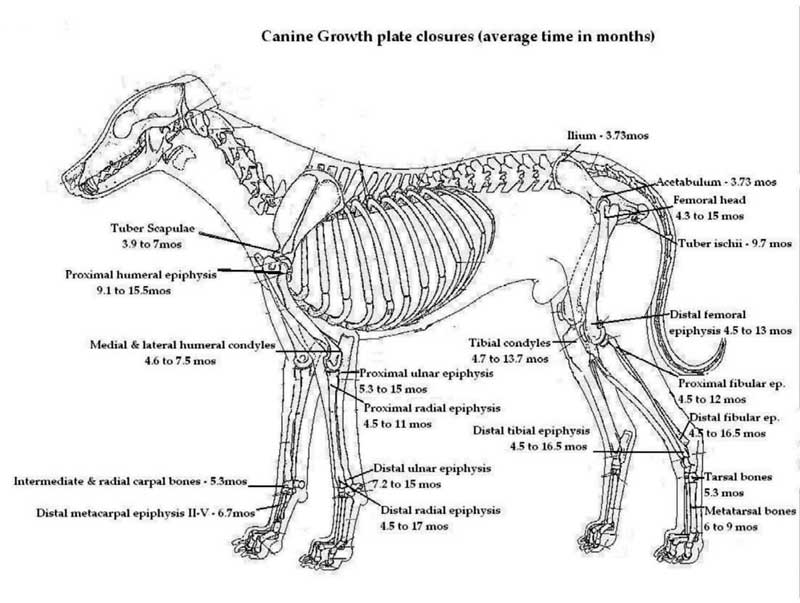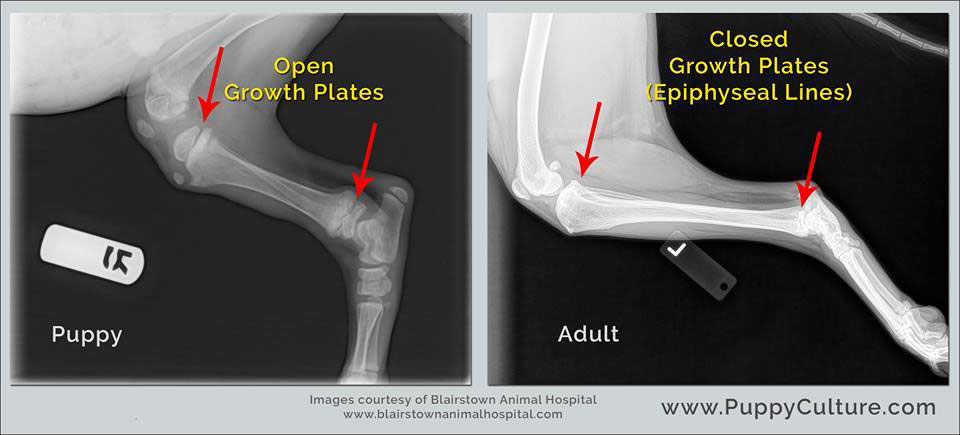Page 10 <previous page > <next page>
SOME HEALTH & SCIENCE NEWS

1. ARTICLES CIRCULATING ABOUT HEART DISEASE IN DOGS
2. FDA ISSUES WARNING ABOUT FLEA AND TICK PRODUCTS
3. GROWTH PLATES
ARTICLES CIRCULATING ABOUT HEART DISEASE IN DOGS
Dr. Jean Dodds' Pet Health Research Blog

Articles currently circulating state that grain-free dog foods cause the heart disease condition called dilated cardiomyopathy (DCM) in dogs due to a taurine deficiency. These articles fail to paint a clear picture, and are biased and misleading because they largely ignore prior scientific research studies into taurine deficiency and DCM.
Our Unequivocal Statement: No independent survey or scientific research has been finished or published yet to conclude whether or not grain-free dog foods cause taurine deficiency that leads to DCM in dogs.
Unfortunately, the U.S. Food and Drug Administration (FDA) unwittingly prompted these articles to be written when it recently gave a warning about a possible connection. Since then, the FDA has elucidated its initial warning and stated, “At this time, we are not advising dietary changes based solely on the information we have gathered so far. If you have questions or concerns about your dog’s health or its diet, we suggest that you consult your veterinarian for individualized advice that takes into account your dog’s specific needs and medical history.”
In this article, we will discuss:
![]() Taurine
Taurine
![]() Industry pushback
Industry pushback
![]() Prior research
Prior research
![]() Active survey research and how you can help
Active survey research and how you can help
![]() Suggestions before you switch foods
Suggestions before you switch foods
![]() What’s next
What’s next
Taurine
![]() Taurine is an amino acid.
Taurine is an amino acid.
![]() Amino acids are found in animal-based protein sources and plant sources like soy at varying amounts, depending on the type of meat or plant.
Amino acids are found in animal-based protein sources and plant sources like soy at varying amounts, depending on the type of meat or plant.
![]() Taurine deficiency can lead to heart disease, specifically DCM, in humans, cats and dogs.
Taurine deficiency can lead to heart disease, specifically DCM, in humans, cats and dogs.
![]() All breeds and sizes of dogs can develop DCM. However, DCM is more common in larger and giant breeds such as Great Danes, Boxers, Newfoundlands, Irish Wolfhounds, Saint Bernards and Doberman Pinschers. American and English Cocker Spaniels also have a higher incidence.
All breeds and sizes of dogs can develop DCM. However, DCM is more common in larger and giant breeds such as Great Danes, Boxers, Newfoundlands, Irish Wolfhounds, Saint Bernards and Doberman Pinschers. American and English Cocker Spaniels also have a higher incidence.
![]() At this time, taurine is not considered an essential, food-sourced amino acid for dogs. Taurine is synthesized in the liver from the amino acids cysteine and methionine, which should provide sufficient quantities to meet dogs’ metabolic needs.
At this time, taurine is not considered an essential, food-sourced amino acid for dogs. Taurine is synthesized in the liver from the amino acids cysteine and methionine, which should provide sufficient quantities to meet dogs’ metabolic needs.
Industry Pushback
Granted, the pet product industry has a vested interest in continuing to produce grain-free foods. We wholly agree with much of this reporting that rebuts the bold assertions about grain-free diets and taurine deficiency.
Pet Business Excerpts
![]() However, when you look more closely, it becomes clear that there is very little hard evidence about any general connection the ingredients might have to DCM.
However, when you look more closely, it becomes clear that there is very little hard evidence about any general connection the ingredients might have to DCM.
![]() While the FDA points out that four of the reports involved dogs that had a deficiency of the amino acid taurine in their blood, which is well-documented as potentially leading to DCM in certain breeds, four other dogs involved in these reports had normal blood taurine levels. What’s more, the FDA does not mention any evidence specifically connecting taurine deficiencies with grain-free diets.
While the FDA points out that four of the reports involved dogs that had a deficiency of the amino acid taurine in their blood, which is well-documented as potentially leading to DCM in certain breeds, four other dogs involved in these reports had normal blood taurine levels. What’s more, the FDA does not mention any evidence specifically connecting taurine deficiencies with grain-free diets.
Pet Food Industry Excerpts
![]() When I asked several well-regarded and experienced companion animal nutritionists about it, they all had the same response: if diet is a cause or contributor to these cases of DCM (and that’s still a big “if”), it’s likely due to the formulation matrix, not the individual ingredients. In other words, the balance and proportion of the ingredients in relation to each other, how they are processed and — most importantly — whether the diets are delivering essential nutrients to the dogs.
When I asked several well-regarded and experienced companion animal nutritionists about it, they all had the same response: if diet is a cause or contributor to these cases of DCM (and that’s still a big “if”), it’s likely due to the formulation matrix, not the individual ingredients. In other words, the balance and proportion of the ingredients in relation to each other, how they are processed and — most importantly — whether the diets are delivering essential nutrients to the dogs.
![]() This investigation is still in very early days, and there truly is no information or data, at least not yet, showing a definite connection between the ingredients indicated and the atypical cases of DCM.
This investigation is still in very early days, and there truly is no information or data, at least not yet, showing a definite connection between the ingredients indicated and the atypical cases of DCM.
![]() And that points to the true, underlying problem: we just don’t know enough about dog and cat nutrition, due to an ongoing lack of published research and data available.
And that points to the true, underlying problem: we just don’t know enough about dog and cat nutrition, due to an ongoing lack of published research and data available.
Prior Research
Several research studies have been conducted into taurine deficiency in dogs. We summarize three.
![]() Delaney et al., June 2003: Mean whole blood taurine concentrations were lower in dogs fed diets containing whole grain rice, rice bran or barley. The lowest whole blood concentrations were seen in dogs fed lamb or lamb meal and rice diets. Plasma methionine and cysteine concentrations were lower in dogs fed diets with animal meals or turkey, and whole grain rice, rice bran or barley.
Delaney et al., June 2003: Mean whole blood taurine concentrations were lower in dogs fed diets containing whole grain rice, rice bran or barley. The lowest whole blood concentrations were seen in dogs fed lamb or lamb meal and rice diets. Plasma methionine and cysteine concentrations were lower in dogs fed diets with animal meals or turkey, and whole grain rice, rice bran or barley.
![]() Backus et al., 2006: All dogs were fed the same kibble that consisted of lamb meal and rice. Beet pulp was not listed as an ingredient. These findings support the theory that taurine deficiency in dogs may be related to the consumption of certain dietary ingredients. Taurine deficiency in dogs is suggested to result from reduced sulfur amino acid bioavailability in dietary ingredients that are heat processed, such as rendered meat meals.
Backus et al., 2006: All dogs were fed the same kibble that consisted of lamb meal and rice. Beet pulp was not listed as an ingredient. These findings support the theory that taurine deficiency in dogs may be related to the consumption of certain dietary ingredients. Taurine deficiency in dogs is suggested to result from reduced sulfur amino acid bioavailability in dietary ingredients that are heat processed, such as rendered meat meals.
![]() Ko and Fascetti, 2016: Rather than rice, dietary beet pulp showed the most significant effect in lowering plasma and whole taurine concentrations, in part, by decreasing the protein digestibility (sulfur amino acid bioavailability), by enhancing fecal excretion of bile acids and possibly, by enhancing degradation of taurine by the gut microflora in dogs. These findings may result from the greater effect of beet pulp fiber than rice bran or cellulose on intestinal bacterial fermentation that cleaves taurocholic acid and destroys the taurine released. Cellulose was the control fiber in this study – and rice bran caused similar responses as cellulose – the study authors concluded that rice bran is unlikely the cause of the increased risk of taurine deficiency in dogs fed lamb and rice diets.
Ko and Fascetti, 2016: Rather than rice, dietary beet pulp showed the most significant effect in lowering plasma and whole taurine concentrations, in part, by decreasing the protein digestibility (sulfur amino acid bioavailability), by enhancing fecal excretion of bile acids and possibly, by enhancing degradation of taurine by the gut microflora in dogs. These findings may result from the greater effect of beet pulp fiber than rice bran or cellulose on intestinal bacterial fermentation that cleaves taurocholic acid and destroys the taurine released. Cellulose was the control fiber in this study – and rice bran caused similar responses as cellulose – the study authors concluded that rice bran is unlikely the cause of the increased risk of taurine deficiency in dogs fed lamb and rice diets.
Active Research
The FDA is actively taking reports from pet parents whose companion dogs are diagnosed with DCM, so long as diet is suspected as the cause. We encourage everyone to report at the FDA’s Safety Reporting Portal.
Suggestions
We should remember that DCM is heart disease. Overall, heart disease is a slow, progressive disease that is impacted by a number of factors such as genetics, environment and diet.
In the instance of diet-related taurine deficiency potentially causing or contributing to DCM, we need to think of two types of diagnostic plans: preventative and disease. Preventative plans would be to stave off the disease progression. So, if your dog is not showing signs of any type of cardiac-related disease, think about choosing the preventative method first.
Preventative Diagnosis
You can have a sample of your companion dog’s blood sent to one of two laboratories that measure taurine and other amino acids. Your veterinarian will know what sample to draw based on the particular laboratory’s requirements.
![]() University of California Davis School of Veterinary Medicine – Run by Dr. Andrea Fascetti who coauthored the beet pulp study mentioned above.
University of California Davis School of Veterinary Medicine – Run by Dr. Andrea Fascetti who coauthored the beet pulp study mentioned above.
![]() Wisconsin Veterinary Diagnostic Laboratory at the University of Wisconsin
Wisconsin Veterinary Diagnostic Laboratory at the University of Wisconsin
Most importantly, please do not make radical changes to your companion dog’s diet until you have had proper preventative testing done. Before you make dietary changes, if any, you should remember your dog’s food sensitivities and intolerances, as well as consult with your veterinarian or a companion animal nutritionist.
Disease Diagnosis
The signs of DCM vary depending on the breed of dog and stage of the disease. Loss of appetite, pale gums, increased heart rate, coughing, difficulty breathing, periods of weakness, and fainting are signs commonly seen.
Testing for DCM diagnosis includes: listening to the chest with a stethoscope, blood and urine tests, electrocardiogram, and ultrasound (echocardiogram). We would also suggest that you add the whole blood taurine amino acid test to find out if your dog’s particular case of DCM could be diet-related. Plasma taurine level can also be measured.
What’s Next?
The FDA is working on its survey research study. Other private studies are currently underway as well. However, even results of these studies will not lead to any needed widespread dietary change overnight.
Research studies will be pushed to the American Association of Feed Control Officials (AAFCO) to update the minimum amino acid recommendations, or the formulations between meat and other ingredients, for a dog diet to be considered “complete and balanced.” We would anticipate actual AAFCO changes in approximately five years or so.
W. Jean Dodds, DVM
Hemopet / NutriScan
11561 Salinaz Avenue
Garden Grove, CA 92843
References
Backus, R.C., et al. “Low Plasma Taurine Concentration in Newfoundland Dogs Is Associated with Low Plasma Methionine and Cyst(e)Ine Concentrations and Low Taurine Synthesis.” The Journal of Nutrition, vol. 136, no. 10, 1 Oct. 2006, pp. 2525–2533., http://academic.oup.com/jn/article/136/10/2525/4746691.
Delaney, S.J., et al. “Plasma and Whole Blood Taurine in Normal Dogs of Varying Size Fed Commercially Prepared Food.” Journal of Animal Physiology and Animal Nutrition, vol. 87, no. 5-6, June 2003, pp. 236–244., http://www.ncbi.nlm.nih.gov/pubmed/12752830.
Dodds, W. Jean. “Dodds Responds to FDA Statement on Canine Heart Disease, Taurine Deficiency and Potential Dietary Causes.” Dr. Jean Dodds Pet Health Resource, Tumblr, 29 July 2018, http://www.drjeandoddspethealthresource.tumblr.com/post/176405475391/fda-dog-heart-disease#.W8N7GGhKjIW.
“FDA Investigating Potential Connection Between Diet and Cases of Canine Heart Disease.” U.S. Food and Drug Administration, Center for Biologics Evaluation and Research, 12 July 2018, http://www.fda.gov/AnimalVeterinary/NewsEvents/CVMUpdates/ucm613305.htm.
Ko, Kwang Suk, and Andrea Fascetti. “Dietary Beet Pulp Decreases Taurine Status in Dogs Fed Low Protein Diet.” Journal of Animal Science and Technology, vol. 58, Aug. 2016, http://www.ncbi.nlm.nih.gov/pmc/articles/PMC4971673/.
“Questions & Answers: FDA Center for Veterinary Medicine’s Investigation into a Possible Connection Between Diet and Canine Heart Disease.” Animal Health Literacy, U.S. Food and Drug Administration, 10 Aug. 2018, www.fda.gov/AnimalVeterinary/ResourcesforYou/AnimalHealthLiteracy/ucm616279.htm.
Phillips-Donaldson, Debbie. “FDA Dog Food Warning Hasty, Too Focused on Ingredients.” Pet Food Industry, 23 July 2018, www.petfoodindustry.com/blogs/7-adventures-in-pet-food/post/7361-fda-dog-food-warning-hasty-too-focused-on-ingredients.
“The Truth About the FDA’s Grain-Free Dog Food Warning.” Pet Business, 7 July 2018, www.petbusiness.com/The-Truth-About-the-FDAs-Grain-Free-Dog-Food-Warning/.

Dr. Jean Dodds' Pet Health Research Blog
![]()
The US Food and Drug Administration (FDA) issued a warning on September 20, 2018 about the isoxazoline flea and tick products fluralaner for dogs and cats (Bravecto®), afoxalaner for dogs (Nexgard®), and saroloner for dogs (Simparica®). The recently introduced isoxazoline, lotilaner (Credelio®) for dogs falls into this same class.
Dogs and cats with no known prior medical history of muscle tremors, ataxia, and seizures have experienced those adverse reactions to this class of flea and tick preventive pesticides. While the FDA is not pulling the four flea and tick preventatives off the market at this time, they will all have to carry an FDA warning on their packaging.
Clinical, evidenced-based reports have been coming forward for the past several years and many studies are currently percolating about the reported adverse reactions to isoxazolines, synthetic pesticides. Dr. Jean Dodds is currently on a privately convened expert committee researching this topic and their report should be issued soon.
Oftentimes when information such as this is brought to light, veterinarians and researchers can point to certain breed characteristics, age, drug interactions, or genetic mutations. For instance, dogs that are epileptic or prone to seizures should not have spinosads – a natural substance made by a soil bacterium that can be toxic to insects – that is also for treatment or prevention of fleas. Two of the most well-known spinosad products are Trifexis® and Comfortis®.
Another example is the MDR1 gene mutation. This gene undergoes one or more mutations that allow a higher absorption of drugs and toxic substances to enter the central nervous system and then can breach the blood-brain barrier and create adverse reactions. Plus, we know that this gene mutation is most commonly found in dog breeds of herding breed ancestry. According to the Washington State Veterinary Clinical Pharmacology Lab, nearly three of every four Collies in the US have the mutant MDR1 gene. The frequency is about the same in France and Australia, so it is likely that most Collies worldwide have the mutation. The MDR1 mutation has also been found in Shetland Sheepdogs (Shelties), Australian Shepherds, Old English Sheepdogs, English Shepherds, German Shepherds, Long-haired Whippets, Silken Windhounds, and a variety of mixed breed dogs.
This is where this can get tricky with the MDR1 gene mutation. FDA-approved antiparasitic drugs such as ivermectin (Heartgard), selamectin (Revolution), milbemycin oxime (Interceptor) and moxidectin (Advantage Multi; Proheart 6) have been tested and found safe for MDR1-affected dogs when given at the prophylactic heartworm preventative dosage level. Despite this commentary, the present author does not recommend several of these products, especially for toy and small breeds and puppies or those with or at familial risk for autoimmune disorders, including vaccinosis.
Further, if a heartworm preventative is given with a spinosad, isoxazoline, ketoconazole, itraconazole, fluconazole or related antifungals, then serious drug-drug interactions can occur in dogs that have the MDR1 mutation.
While we have known about the MDR1 mutation situation before, the scary part now about the isoxazoline class of drugs is that researchers and veterinarians thus far cannot point to breed characteristics, age group, drug interactions or genetic mutations as contributing factors to the latest findings that prompted the FDA warning. These adverse reactions to the isoxazoline class appear to be affecting pets randomly.
W. Jean Dodds, DVM
Hemopet / NutriScan
11561 Salinaz Avenue
Garden Grove, CA 92843
Growth Plates

